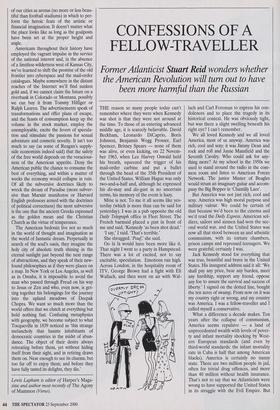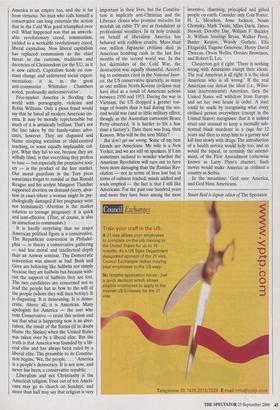CONFESSIONS OF A FELLOW-TRAVELLER
the American Revolution will turn out to have been more harmful than the Russian
THE reason so many people today can't remember where they were when Kennedy was shot is that they were not around at the time. To those of us entering advanced middle age, it is scarcely believable. David Beckham, Leonardo DiCaprio, Boris Johnson, Benjamin Wegg Prosser, Earl Spencer, Britney Spears — none of them was alive, or even kicking, on 22 Novem- ber 1963, when Lee Harvey Oswald held his breath, squeezed the trigger of his mail-order carbine and put a bullet through the head of the 35th President of the United States. William Hague was only two-and-a-half and, although he expressed his dis-may and dis-gust in no uncertain terms, his memory of the event is hazy.
Mine is not. To me it all seems like yes- terday (which is more than can be said for yesterday). I was in a pub opposite the old Daily Telegraph office in Fleet Street. The French barmaid placed a pint in front of me and said, `Kennedy 'as been shot dead.'
`I say,' I said. 'That's terrible.'
She shrugged. 'Pouf,' she said.
Oo la la would have been more like it. That night I went to a party in Hampstead. There was a lot of excited, not to say excitable, speculation. Emotions ran high. Across London, in the hospitality room of ITV, George Brown had a fight with Eli Wallach, and then went on air with Wal- lach and Carl Foreman to express his con- dolences and to place the tragedy in its historical context. He was obviously tight, but was there a slight swelling beneath his right eye? I can't remember.
We all loved Kennedy and we all loved America, most of us anyway. America was rich, cool and sexy; it was Jimmy Dean and rock and roll and Jayne Mansfield and the Seventh Cavalry. Who could ask for any- thing more? At my school in the 1950s we used to stand around the radio in the com- mon room and listen to American Forces Network. The junior Master of Beagles would strum an imaginary guitar and accom- pany the Big Bopper in 'Chantilly Lace'.
But America was not just rich, cool and sexy. America was high moral purpose and military valour. We could be certain of that because we'd been to the cinema and we'd read the Daily Express. American sol- diers, sailors and airmen had won the sec- ond world war, and the United States was now all that stood between us and atheistic communism, with its torture chambers, prison camps and repressed teenagers. We were grateful; certainly I was.
Jack Kennedy stood for everything that was true, beautiful and brave in the United States. His inaugural address said it all: `We shall pay any price, bear any burden, meet any hardship, support any friend, oppose any foe to assure the survival and success of liberty.' I signed on the dotted line, bought the ten acres of swamp. From now on it was my country right or wrong, and my country was America. I was a fellow-traveller and I called myself a conservative.
What a difference a decade makes. Ten years after the collapse of communism, America seems repulsive — a land of unprecedented wealth with levels of pover- ty and infant mortality shocking by West- ern European standards (and even by third-world standards: the infant mortality rate in Cuba is half that among American blacks). America is certainly no nanny state. There are two million people in jail, often for trivial drug offences, and more than 40 million without health insurance. That's not to say that we Atlanticists were wrong to have supported the United States in its struggle with the Evil Empire. But America is an empire too, and she is far from virtuous. No man who calls himself a conservative can long entertain the notion that in the Cold War good triumphed over evil. What happened was that an unwork- able revolutionary creed, communism, yielded to a workable revolutionary creed, liberal capitalism. Now liberal capitalism has replaced communism as the chief threat to the customs, traditions and decencies of Christendom (or the EU, as it is now called). Capitalism feeds on con- stant change and unfettered social experi- mentation; it is, as the great anti-communist Whittaker Chambers noted, 'profoundly anticonservative'.
Free-market America is flooding the world with pornography, violence and Robin Williams. Only a pious fraud would say that he hated all modem American cin- ema. It may be morally reprehensible but much of it is artistically brilliant. That's not the line taken by the family-values advo- cates, however. They are disgusted and blame creeping socialism or child-centred teaching, or some equally implausible cul- prit. What they fail to see, because they are wilfully blind, is that everything they profess to hate — but especially the permissive soci- ety — is the product of the free market. Our moral guardians in the. Tory press sometimes forget to remind us that Ronald Reagan and his acolyte Margaret Thatcher supported abortion on demand (sorry, abor- tion in cases where a woman might be psy- chologically damaged if her pregnancy were not terminated). Abortion is the market solution to teenage pregnancy: it is quick and cost-effective. (That, of course, is also its attraction to communists.) It is hardly surprising that no major American political figure is a conservative. The Republican convention in Philadel- phia — in theory a conservative gathering — had less moral and intellectual depth than an Amway seminar. The Democratic convention was almost as bad. Bush and Gore are behaving like halfwits not simply because they are halfwits but because with- out the support of halfwits they are lost. The two candidates are concerned not to lead the people but to bow to the will of the people (whom they will then betray). It is disgusting. It is demeaning. It is demo- cratic. Above all, it. is American. Many apologists for America — the sort who vote Conservative — resist this notion and say that what is happening now is an aber- ration, the result of the Sixties (if in doubt blame the Sixties) when the United States was taken over by a liberal elite. But the truth is that America was founded by a lib- eral elite and has always been ruled by a liberal elite. The preamble to its Constitu- tion begins, 'We, the people. . . . ' America is a people's democracy. It is not now, and never has been, a conservative republic.
Liberalism and not Christianity is the American religion. Four out of ten Ameri- cans may go to church on Sundays, and more than half may say that religion is very important in their lives, but the Constitu- tion is implicitly anti-Christian and the Liberace clones who promise miracles for moolah on cable TV are as fraudulent as professional wrestlers. In its holy crusade on behalf of liberalism America has behaved with ruthless cruelty. More than one million Japanese civilians died in American bombing raids in the last five months of the second world war. In the hot skirmishes of the Cold War, the destruction was equally shameful. Accord- ing to estimates cited in the National Inter- est, the US conservative quarterly, as many as one million North Korean civilians may have died as a result of American actions between 1950 and 1953. During the war in Vietnam, the US dropped a greater ton- nage of bombs than it had during the sec- ond world war (and to little military effect; though, as the Australian cartoonist Bruce Petty observed, 'it is harder to hit a hoe than a factory'). Then there was Iraq, then Kosovo. Who will be the next Hitler?
But don't get me wrong. Some of my best friends are Americans. My wife is a New Yorker, and we are still on speakers. If I am sometimes inclined to wonder whether the American Revolution will turn out to have been more damaging than the Russian Rev- olution — not in terms of lives lost but in terms of cultures trashed, minds addled and souls emptied — the fact is that I still like Americans. For the past one hundred years and more they have been among the most inventive, charming, principled and gifted people on earth. Consider only Cole Porter, H. L. Mencken, Jesse Jackson, Noam Chomsky, Mark Twain, Miles Davis, James Stewart, Dorothy Day, William F. Buckley Jr, William Jennings Bryan, Walker Percy, Buster Keaton, Woody Guthrie, Ella Fitzgerald, Eugene Genovese, Henry David Thoreau, Orson Welles, Orestes Brownson, and Robert E. Lee.
Chesterton got it right: 'There is nothing wrong with Americans except their ideals. The real American is all right; it is the ideal American who is all wrong.' If the real American can defeat the ideal (i.e., Wilso- nian interventionist) American, then the United States will withdraw from Europe and set her own house in order. A start could be made by recognising what every civilised person everywhere (except in the United States) recognises: that it is indeed cruel and unusual to keep a mentally sub- normal black murderer in a cage for 12 years and then to strap him to a gurney and kill him slowly with drugs. The introduction of a health service would help too, and so would the repeal, or certainly the amend- ment, of the First Amendment (otherwise known as Larry Flynt's charter). Such moves would make America as civilised a country as Serbia.
In the meantime, God save America, and God bless Americans.
Stuart Reid is deputy editor of The Spectator.























































































 Previous page
Previous page